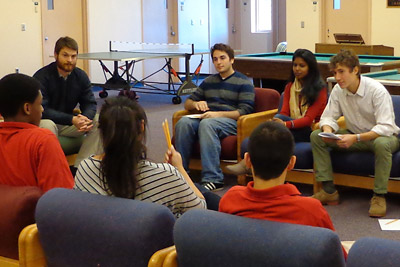Debate team shares skills with incarcerated youths
By Abigail Warren

Members of Cornell’s internationally top-ranked Forensics Society are sharing their debate skills with incarcerated youths. Team members meet residents at the MacCormick Secure Center in Brooktondale, N.Y., and the Finger Lakes Residential Center in Lansing, N.Y., to “expose them to debate and critical thinking,” said ILR grad student and volunteer Jesse Klinger.
In addition to offering the inmates an interactive activity, debate lessons “show them that there are two sides to controversial issues,” said Klinger.
The program, which was formed at MacCormick, has expanded to the Finger Lakes center. Groups of inmates at both detention facilities continue to be excited about the program and willingly come back week to week for more instruction.
Debate is taught to the youths through the acts of discussion and debate themselves. Using the World Format of debate, Cornell students talk with them about current event issues. They encourage the youths to voice their opinions about issues they are passionate about. The newspapers the Cornellians bring with them to the facilities often spark mini mock debates.
Some debate team members were surprised to discover that inmates weren’t interested in talking about elementary topics but wanted to talk about larger, controversial issues, says Leah Salgado, assistant director of the Cornell Debate Prison Education Program. Through weekly practices the youths learn how to articulate their thoughts about complex topics.
Salgado explains that the exercises “help [the juveniles] learn how to make logical arguments.” Strengthening their verbal skills is particularly valuable because debate encourages them to “find alternative methods of dealing with disagreements,” Salgado said.
Last semester inmates challenged three Cornell students to a formal debate. In front of an audience, the inmates debated Cornellians on the issue of capital punishment. Debater Shuangyi Hou ’14 noted that at one point a question from an inmate threatened to “dismantle the Cornell debate team’s argument.”
The opportunity to discuss controversial issues such as capital punishment with youths who are incarcerated is one that Cornellian volunteers say they appreciate. Salgado points out that, “last year we only went one day a week, but this semester we’re going two days a week.” With more interest from freshmen and sophomores at Cornell, it seems the desire to give back through debate lessons is “already catching on a bit.”
Expanding to the Finger Lakes Center this year has been particularly important. Salgado notes that there, where the inmate turnover rate is only months, “the kids will eventually go back home and enroll in school.” She highlights the importance of helping them develop methods of conversation and constructive argumentation before they leave.
Salgado says most youths she has encountered are “good kids [who are from] impossible circumstances.” Along with other volunteers, she said that going to the detention facilities and seeing the children improve week to week is “something that makes [her] very happy.”
As Klinger says, “Debate isn’t only about being able to argue with someone from Yale, but being able to have good discussions with people from all walks of life.”
Abigail Warren ’15 is a writer intern for the Cornell Chronicle.
Media Contact
Get Cornell news delivered right to your inbox.
Subscribe